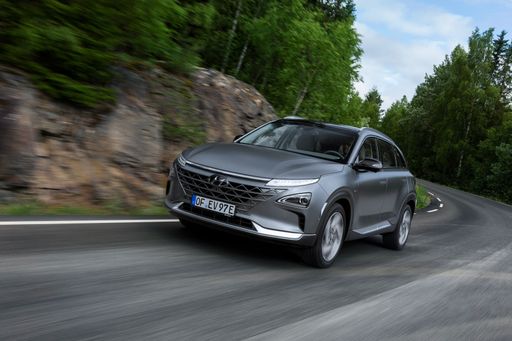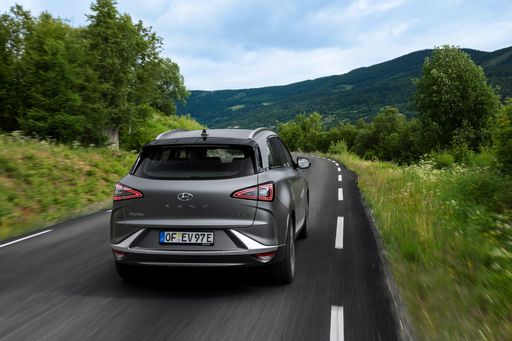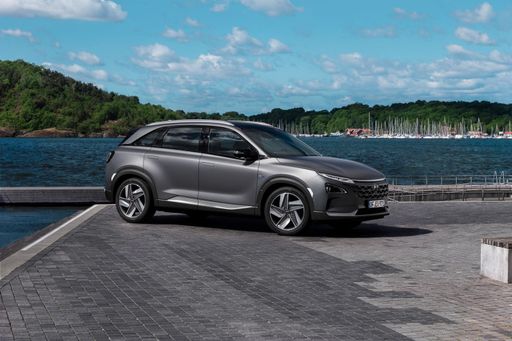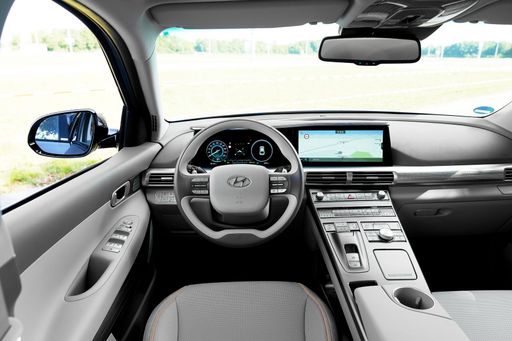Hyundai Nexo vs Maxus Deliver 9 – Differences & prices compared
Compare performance, boot space, consumption and price in one view.
Find out now: which car is the better choice for you – Hyundai Nexo or Maxus Deliver 9?
The Hyundai Nexo (SUV) comes with a Hydrogen engine and Automatic transmission. In comparison, the Maxus Deliver 9 (Cargo Van) features a Diesel or Electric engine with Manuel or Automatic transmission.
When it comes to boot capacity, the Hyundai Nexo offers 461 L, while the Maxus Deliver 9 provides – depending on how much space you need. If you’re looking for more power, decide whether the 163 HP of the Hyundai Nexo or the 204 HP of the Maxus Deliver 9 suits your needs better.
In terms of consumption, the values are per 100 km for the Hyundai Nexo, and 26.20 kWh8.80 L for the Maxus Deliver 9.
Price-wise, the Hyundai Nexo starts at 66400 £, while the Maxus Deliver 9 is available from 38700 £. Compare all the details and find out which model fits your lifestyle best!
Hyundai Nexo
The Hyundai Nexo stands out in the automotive world as a pioneering hydrogen fuel cell vehicle, offering an eco-friendly alternative to conventional engines. Its sleek design combines modern aesthetics with advanced technology, providing a comfortable and futuristic driving experience. The Nexo not only represents a significant step towards sustainable motoring but also impresses with its smooth and silent performance on the road.
details @ hyundai.news
@ hyundai.news
 @ hyundai.news
@ hyundai.news
 @ hyundai.news
@ hyundai.news
 @ hyundai.news
@ hyundai.news
Maxus Deliver 9
The Maxus Deliver 9 presents itself as a robust and versatile vehicle, perfectly suited for both urban and rural deliveries. With a spacious cargo area and a modern cabin equipped with advanced technology, it caters to the needs of both driver comfort and logistical efficiency. Its sleek design and reliable performance make it an attractive option for businesses looking to upgrade their fleet.
details

|
|
|
|
|
Costs and Consumption |
|
|---|---|
|
Price
66400 - 71000 £
|
Price
38700 - 60200 £
|
|
Consumption L/100km
-
|
Consumption L/100km
8.80 L
|
|
Consumption kWh/100km
-
|
Consumption kWh/100km
26.2 - 30.8 kWh
|
|
Electric Range
666 km
|
Electric Range
287 - 358 km
|
|
Battery Capacity
-
|
Battery Capacity
-
|
|
co2
0 g/km
|
co2
0 - 231 g/km
|
|
Fuel tank capacity
6 L
|
Fuel tank capacity
-
|
Dimensions and Body |
|
|---|---|
|
Body Type
SUV
|
Body Type
Cargo Van
|
|
Seats
5
|
Seats
3 - 7
|
|
Doors
5
|
Doors
4
|
|
Curb weight
1889 kg
|
Curb weight
2360 - 2770 kg
|
|
Trunk capacity
461 L
|
Trunk capacity
-
|
|
Length
4670 mm
|
Length
5546 - 5940 mm
|
|
Width
1860 mm
|
Width
2062 mm
|
|
Height
1630 mm
|
Height
2525 - 2755 mm
|
|
Payload
451 kg
|
Payload
730 - 1140 kg
|
Engine and Performance |
|
|---|---|
|
Engine Type
Hydrogen
|
Engine Type
Diesel, Electric
|
|
Transmission
Automatic
|
Transmission
Manuel, Automatic
|
|
Transmission Detail
Reduction Gearbox
|
Transmission Detail
Manual Gearbox
|
|
Drive Type
Front-Wheel Drive
|
Drive Type
Front-Wheel Drive
|
|
Power HP
163 HP
|
Power HP
148 - 204 HP
|
|
Acceleration 0-100km/h
9.2 - 9.5 s
|
Acceleration 0-100km/h
16 - 19 s
|
|
Max Speed
177 - 179 km/h
|
Max Speed
100 - 160 km/h
|
|
Torque
395 Nm
|
Torque
330 - 375 Nm
|
|
Number of Cylinders
-
|
Number of Cylinders
4
|
|
Power kW
120 kW
|
Power kW
108 - 150 kW
|
|
Engine capacity
-
|
Engine capacity
1996 cm3
|
General |
|
|---|---|
|
Model Year
2018 - 2021
|
Model Year
2022 - 2024
|
|
CO2 Efficiency Class
A
|
CO2 Efficiency Class
G, A
|
|
Brand
Hyundai
|
Brand
Maxus
|
Hyundai Nexo
Introducing the Hyundai Nexo: A Step into the Future of Automobiles
The Hyundai Nexo represents a groundbreaking stride in the realm of hydrogen-powered vehicles, aligning cutting-edge technology with environmental sustainability. As an SUV, it offers an impressive blend of performance, efficiency, and style, challenging the conventional norms of automotive engineering.
Advanced Hydrogen Technology
At the heart of the Hyundai Nexo's innovation is its hydrogen fuel cell powertrain, a marvel that enables the vehicle to achieve zero CO2 emissions, boasting a remarkable CO2-Effizienzklasse of A. This SUV offers the dual advantages of an eco-friendly footprint with the substantial performance of a traditional combustion engine.
Impressive Performance Metrics
Equipped with a robust 120 kW (163 PS) motor, the Nexo can accelerate from 0 to 100 km/h in a commendable span of 9.2 to 9.5 seconds. This makes the Nexo not just a green choice but also a viable option for those who value brisk acceleration and dynamic driving capabilities. Furthermore, the vehicle manages a top speed of 177 to 179 km/h, showcasing its ability to hold its own on motorways.
Efficient Design and Spacious Comfort
The Nexo’s dimensions, at 4670 mm in length, 1860 mm in width, and 1630 mm in height, underline its role as a spacious and practical SUV. Inside, it comfortably seats up to five occupants, ensuring a luxurious ride experience complemented by its 461-litre boot capacity, ideal for both daily commutes and longer journeys.
State-of-the-Art Features
Hyundai's commitment to excellence is evident in the Nexo’s suite of advanced features. The Prime-Paket trim offers sophistication and practicality, integrating seamless technology with high-quality materials that redefine interior comfort and style. Despite its avant-garde hydrogen technology, Hyundai hasn't compromised on the intuitive user experience.
Cost and Efficiency Analysis
With monthly running costs between €1680 and €1786 and variable costs per kilometre from 67.2 to 71.5 cents, the Hyundai Nexo is an investment in future-oriented automotive excellence. Its distinctive lack of CO2 emissions assures potential owners of its sustainability, while its running costs reflect the premium nature of its innovative technology.
Conclusion: The Future is Hydrogen
The Hyundai Nexo serves as a testament to the potential of hydrogen as a mainstream fuel source. By offering leading-edge technology, notable performance, and unbeatable efficiency, the Nexo positions itself as a beacon of future mobility. For those ready to embrace the next chapter of automotive evolution, the Nexo awaits as a stellar option.
Maxus Deliver 9
A Versatile Workhorse: The Maxus Deliver 9
The Maxus Deliver 9 is rapidly gaining traction in the commercial vehicle sector. As a versatile and capable van, it meets the needs of a range of industries, providing both diesel and electric powertrains. The model year updates from 2020 to 2023 bring a host of technical advancements and innovative features that make the Maxus Deliver 9 stand out in its class.
Powertrain Options: Diesel and Electric
The Maxus Deliver 9 offers a choice between traditional diesel and modern electric powertrains. The diesel variant comes with a 2.0-litre engine, delivering 148 PS and a torque of 310 Nm. It is available with both front and rear-wheel drive configurations, coupled with a manual gearbox. These options provide robust and reliable performance for traditionalists who favour a dependable diesel setup.
For those looking to the future, the electric eDeliver 9 offers compelling specifications. With a power output of 204 PS and torque reaching 375 Nm, the electric version provides a silent and efficient drive. Battery capacity options cater to different needs, with ranges spanning from 265 km to an impressive 328 km depending on the chosen battery configuration. This makes the eDeliver 9 a viable choice for urban and regional deliveries.
Innovative Features for Enhanced Utility
The Maxus Deliver 9 is equipped with features designed to enhance practicality and comfort. With a payload capacity ranging from 630 to 1275 kg, it is well-suited for various commercial applications. The model’s dimensions and configurable seating options (accommodating between 3 to 7 passengers) add flexibility, making it ideal for both logistics and passenger transport roles.
Despite its work-focused design, the Deliver 9 doesn’t skimp on creature comforts. The cabin offers a modern infotainment system with touchscreen capabilities, providing intuitive control over navigation and connectivity functions. Advanced safety features, including lane departure warning and adaptive cruise control, are available, ensuring peace of mind for drivers and fleet managers alike.
Environmental and Economic Efficiency
In an era where sustainability is paramount, the Maxus Deliver 9 delivers low operating costs and reduced environmental impact, particularly in its electric form. The electric models boast zero tailpipe emissions and CO2 efficiency class ratings up to A, making them an attractive choice for green-conscious businesses.
From an economic standpoint, the electric variants also offer long-term savings through reduced fuel costs and maintenance requirements compared to their diesel counterparts. Initial pricing for the Deliver 9 ranges from €43,423 to €93,403, depending on the specification and powertrain, representing competitive value within the segment.
Conclusion: Meeting Modern Transport Needs
The Maxus Deliver 9 represents a compelling proposition in the commercial vehicle market. With its blend of diesel and electric powertrains, innovative features, and a focus on efficiency, it meets the diverse needs of modern businesses. Whether prioritising traditional power or embracing new technologies, the Deliver 9 offers a versatile choice that businesses can rely on for both present and future transportation needs.
The prices and data displayed are estimates based on German list prices and may vary by country. This information is not legally binding.
